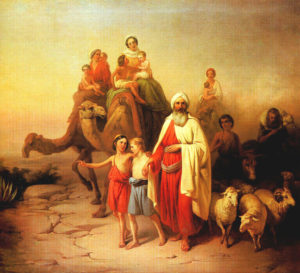7 Remember the days of old;
consider the years of many generations;
ask your father, and he will show you,
your elders, and they will tell you.
8 When the Most High gave to the nations their inheritance,
when he divided mankind,
he fixed the borders of the peoples
according to the number of the sons of God.
9 But the Lord’s portion is his people,
Jacob his allotted heritage. (Deuteronomy 32:7-9)
Once the nations are divided and disinherited God immediately puts a plan in place to bring them back to Him. Genesis moves from the Tower of Babel story and into a genealogy that leads to Abram. Abram is a 10th generation descendant of Noah’s son Shem and part of a wealthy family in Mesopotamia. God appears to Abram at the city of Ur (modern day Iraq) where he and his family live. He tells Abram to take his family and leave their home and to migrate to the land of Canaan. Yahweh God has decided that Abram and his wife Sarai will be the parents of a people that will become His elect and inheritance among the nations.They are to be a nation of priests to show the truth of Yahweh and lead the disinherited nations (the Gentiles) back to God.
Now the Lord said to Abram, “Go from your country and your kindred and your father’s house to the land that I will show you. 2 And I will make of you a great nation, and I will bless you and make your name great, so that you will be a blessing. 3 I will bless those who bless you, and him who dishonors you I will curse, and in you all the families of the earth shall be blessed.” (Genesis 12:1-3)
Abraham moving his household via caravan. Remember that Abraham was a man of great wealth in his day.
Over the decades that follow Abram, Sarai, and their household move around the region and eventually end up in the land of Canaan, or modern day Israel. This is the land that Yahweh promises Abraham as the territory of this new nation.
“Lift up your eyes and look from the place where you are, northward and southward and eastward and westward, 15 for all the land that you see I will give to you and to your offspring forever. 16 I will make your offspring as the dust of the earth, so that if one can count the dust of the earth, your offspring also can be counted. 17 Arise, walk through the length and the breadth of the land, for I will give it to you.” (Genesis 13:14-17)
There’s only one problem (at least in the eyes of Abram and Sarai. Sarai is barren and well beyond child bearing age. When Yahweh God first appears to Abraham they are both 75 years and this causes them both a lot of anxiety. They want their promised child very badly and this desire causes them to question God and even try to fulfil His promise in their own terms.
Abram gives council to Sarai by James Tissot. Painting is in the public domain.
If you have experience with couples that have tried for many years to have children, you know they can get quite desperate. Many times they will turn to expensive fertilization procedures and other methods that can be risky for both the mother and the resulting unborn child. Frustration and guilt over repeated failures can even cause enough tension in the marriage to the point of divorce. It’s not a good situation.
Now, imagine a couple that has been trying to have children for decades and are getting very old (Abraham was 75 when he was first called by God. They are desperate to have this promise come true and pray to Yahweh asking where their child is:
And Abraham said, “Behold, you have given me no offspring, and a member of my household will be my heir.” 4 And behold, the word of the Lord came to him: “This man shall not be your heir; your very own son shall be your heir.” 5 And he brought him outside and said, “Look toward heaven, and number the stars, if you are able to number them.” Then he said to him, “So shall your offspring be.” 6 And he believed the Lord, and he counted it to him as righteousness.” (Genesis 15:3-5)
The Egyptian slave Hagar is presented to Abram by his wife Sarai. Image is in the public domain.
So, Yahweh has reassured them but still years pass and there is no child. Doubt starts to creep into their minds. In the Ancient Near East, an inability to have children was always seen as the woman’s fault and generally as a divine judgement against the woman. Because Sarai was a woman living in that culture she started to wonder if she had angered Yahweh or otherwise done something to make Him prevent her from having a child. As we will see in the next article, Abram and Sarai take matters into their own hands leading to consequences that continue for thousands of years.


